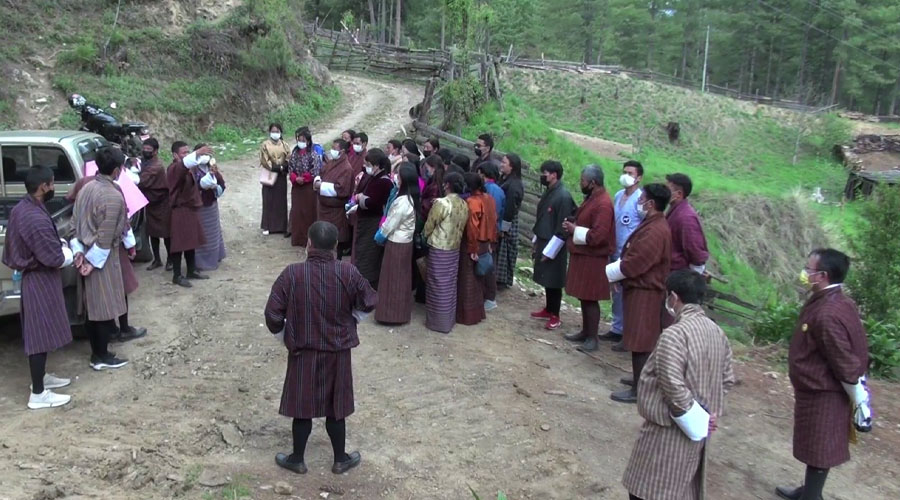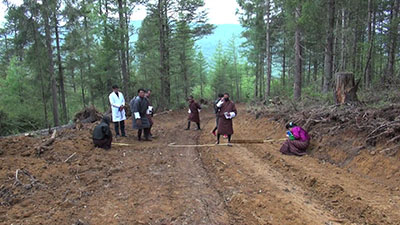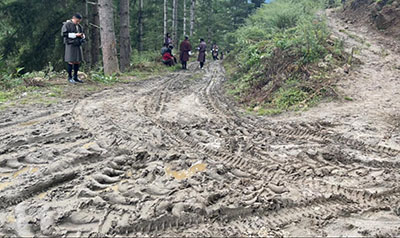
The Bhutan Transparency Initiative’s (BTI) social accountability exercises are helping empower rural communities to combat corruption at the grassroots level. They allow trained community representatives to assess the quality of developmental projects and services rendered by public servants and elected officials. The civil society organisation is currently in Bumthang, engaging communities in evaluating their service providers.
As part of the social accountability exercise, the Bhutan Transparency Initiative uses the “Community Score Card” to prevent corruption at the grassroots.
Through this tool, the community’s representatives who are also members of this CSO, usually visit public infrastructure development sites.
They evaluate the sites carried out by the service providers such as gups, agriculture and livestock extension officers, and other gewog officials.
 During a similar exercise at Chhumey Gewog in Bumthang, the representatives assessed an ongoing farm road construction.
During a similar exercise at Chhumey Gewog in Bumthang, the representatives assessed an ongoing farm road construction.
“We first train the people and then we implement the training lessons practically. For instance, today the community’s representatives came here to inspect the width of the road, which should ideally be 5.1 metres wide as per the plan,” elaborated Kinley Drukpa, Programme Officer with the BTI.
If there are shortcomings, the service providers and the representatives called a Social Accountability Practitioners’ Group sit together to discuss issues from both sides.
Following the discussion, the meeting develops a mutually agreed action plan for activities that need to be rectified. But the Bhutan Transparency Initiative says it is daunting for the communities to get access to information regarding developmental projects.
“We have the MoU signed between the gewog administrations, the social accountability practitioners’ groups and BTI. The MoU says if the social accountability practitioners want to assess any programmes or plans using a Community Score Card, they can do that and whatever information they require, the gewog will provide it. If the gewog doesn’t have it, they will have to source it from the dzongkhag administration and so on,” said the Executive Director of BTI, Dr Rinzin Rinzin (PhD).
 Last year’s assessment of a farm road at Oongsang village in Chhumey Gewog through a Community Score Card proved effective. It was discovered that the quality of the road’s base course was unacceptable, leaving villagers disappointed and miffed.
Last year’s assessment of a farm road at Oongsang village in Chhumey Gewog through a Community Score Card proved effective. It was discovered that the quality of the road’s base course was unacceptable, leaving villagers disappointed and miffed.
So, the district administration asked the contractor to rework the project.
“The base course is much better now. When we hold the service providers accountable, they ask the contractors to rectify the works. If we don’t make our voices heard, service providers usually think we are happy with their works,” shared Nakphey, a resident in Oongsang village.
Some local leaders there said the social accountability exercise will enhance government accountability and transparency.
“Such exercises have to be initiated by all the local leaders across the country so that the government’s budget isn’t wasted. The BTI’s training has helped people in understanding how developmental activities are carried out and then questioning us. This will have positive implications on good governance,” said Chhumey Gup, Jampel.
Today, each chiwog in the gewog has five members in the Social Accountability Practitioners’ Group. They view themselves to be in a crucial position to ensure check and balance in the system of the government.
“Besides many things, we can monitor if the contractor is using the gewog’s budget wisely. So we can keep a tab on the quality of developmental works, meant for us,” told Dechen Yangzom, a member of Phurjoen Social Accountability Practitioners’ Group in Chhumey.
Other members termed their role as a watchdog of the government.
“So far, we did not know how planned activities are carried out. Now we should be aware of the budget received by the dzongkhag and gewog offices annually and question those who spend them,” added Kunzang Dorji, a member of Domkhar Social Accountability Practitioners’ Group in Chhumey.
Other than Bumthang, the Bhutan Transparency Initiative conducted social accountability exercises in Paro, Thimphu including its thromde and Zhemgang and Gelegphu Thromde. It aims to institutionalise such exercises in all the gewogs and remaining thromdes by 2027.
According to the Corruption Perception Index 2021 of Transparency International, Bhutan ranked 25th among 180 countries and territories.
In 2020, the country stood in 24th position. Transparency International is a Germany based non-governmental organisation with a global movement against corruption.
Kipchu, Bumthang
Edited by Pema Lhaden







